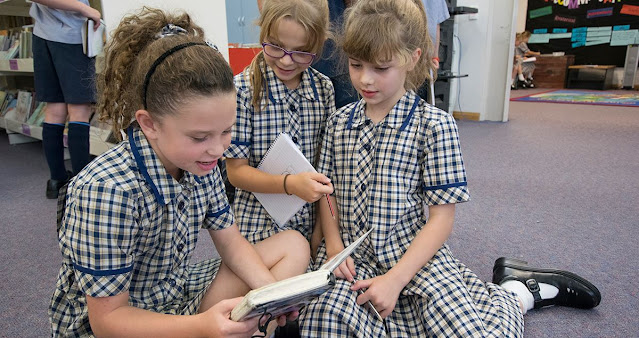Slice of Life Story - Talk, Question, Wonder!

The child of my youth appears to have gone the way of tape recorders, cassette players and the like. At the very least they are an endangered species. When sharing childhood experiences with today’s generation of students, I realized that our respective childhood experiences are literally a world apart.
My generation grew up in small houses with big backyards. The focus of our daily existences was the world outdoors. We had extraordinary freedom to explore our immediate world. The children I now work with, (and I’m talking in general terms here) live in bigger houses, with small backyards and the focus of their lives is frequnelty indoors. The growth of technology in its myriad forms calls them like a siren to remain under cover. X box, computer games, dvd’s win out over an outdoor lifestyle. Freedom extends to the front gate for many of these children. The world has become a more potentially dangerous place. Anxious parents control so much of the time children spend beyond school. Many children’s lives are timetabled. This leaves little time to explore, create and generally discover the wider wonders of the world. The kids that do live this kind of life are the lucky ones.
This week while debriefing with teachers, I noticed a recurring theme. Teachers are lamenting a general lack of world knowledge among their students. They feel that they now are doing a lot more compensatory teaching. Trying to encourage greater student awareness of the world around them is consuming more of their teaching time. Encouraging sensory awareness, noticing small natural wonders, celebrating simple pleasures have assumed a greater importance. Rejuvenating the sensory perceptions of students has become something that requires attention.
My generation grew up in small houses with big backyards. The focus of our daily existences was the world outdoors. We had extraordinary freedom to explore our immediate world. The children I now work with, (and I’m talking in general terms here) live in bigger houses, with small backyards and the focus of their lives is frequnelty indoors. The growth of technology in its myriad forms calls them like a siren to remain under cover. X box, computer games, dvd’s win out over an outdoor lifestyle. Freedom extends to the front gate for many of these children. The world has become a more potentially dangerous place. Anxious parents control so much of the time children spend beyond school. Many children’s lives are timetabled. This leaves little time to explore, create and generally discover the wider wonders of the world. The kids that do live this kind of life are the lucky ones.
This week while debriefing with teachers, I noticed a recurring theme. Teachers are lamenting a general lack of world knowledge among their students. They feel that they now are doing a lot more compensatory teaching. Trying to encourage greater student awareness of the world around them is consuming more of their teaching time. Encouraging sensory awareness, noticing small natural wonders, celebrating simple pleasures have assumed a greater importance. Rejuvenating the sensory perceptions of students has become something that requires attention.
An experienced teacher told me that she thinks our childhoods were more like the adventures of Tom Sawyer. The childhoods of two many of today's children lack that element of real adventure. Maybe she'r right. Coddled, constrained and covered in anti bacterial makes it difficult to live childhood as it was intended.
Ben, a young teacher I work with told me today that ants invaded his classroom. He decided to investigate the matter more fully and took his class on a mission of discovery to find where the ants were actually coming from. They tracked them down to a tree outside the classroom where the ants were found in mass profusion at the higher reaches of the tree. They watched the ants and discussed the possible reasons as to why the ants were there and in the classroom. They drew the ants and some even decided to write about the ants. One student drew a picture of the tree with a huge ant ‘castle’ in it. Ben and his students had shared a teachable moment. It was an invaluable chance to wonder and speculate.
It is evident that rich conversations in the home have been replaced by watching and viewing. We have a visual generation, but verbally they are often undernourished. This points to the increasing importance of conducting quality conversations in the classroom. Talk is a critical pre writing requisite. When kids have the opportunity to articulate their writing intentions; to discuss and clarify ideas, they generally produce more effective writing pieces.
Ben, a young teacher I work with told me today that ants invaded his classroom. He decided to investigate the matter more fully and took his class on a mission of discovery to find where the ants were actually coming from. They tracked them down to a tree outside the classroom where the ants were found in mass profusion at the higher reaches of the tree. They watched the ants and discussed the possible reasons as to why the ants were there and in the classroom. They drew the ants and some even decided to write about the ants. One student drew a picture of the tree with a huge ant ‘castle’ in it. Ben and his students had shared a teachable moment. It was an invaluable chance to wonder and speculate.
It is evident that rich conversations in the home have been replaced by watching and viewing. We have a visual generation, but verbally they are often undernourished. This points to the increasing importance of conducting quality conversations in the classroom. Talk is a critical pre writing requisite. When kids have the opportunity to articulate their writing intentions; to discuss and clarify ideas, they generally produce more effective writing pieces.





Comments
Post a Comment